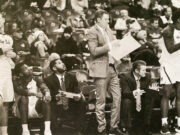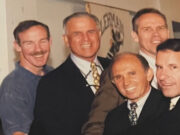I could use some help with a particular part of my golf game. How do I keep my motivation high after I hit a poor shot? Do you have any thoughts? Often my game will come apart after a flubbed shot. This is especially true when the bad shot has been just the type of shot that is the best part of my game.
Response by Editor: It’s coincidental that I was having thoughts about this issue a couple of weekends ago. You might be wondering what I’m referring to. The professional golf tour was in Florida…at the Doral. The last hole was a killer. Tiger Woods was leading by two strokes. I was watching the last round in my easy chair and thinking it’s all over. He will drive it straight and long and probably birdie this hole. He’ll win by three strokes. I get up from my chair and pick up the remote control to turn the set off. I needed to get going to an Oscars party at a friend’s house. With the clicker in hand, I took one more glance at Tiger setting up for his drive. You see I always like watching Tiger set up – it’s like a ballet. He proceeded to go through his swing and drove the shot very close to a large banyan tree on the far right side of the fairway. Now what do I do. Well, I did what any golf addict would do, I sat back down. He started his march towards his golf ball. You could see Tiger was not happy with the shot.
What might be going through your mind if you were in his predicament? Maybe some of the following thoughts: I’m so disgusted. I was so close to winning. I had to hit that shot? My most reliable club and I blew it. What stupid thing am I going to do next? I should have hit a three wood and put myself safely in the fairway. What was I thinking? I’m going to lose $480,000. My wife is going to be a little more than just annoyed at me. I’m so embarrassed. The crowd is making a weird noise. If only the couple before me had finished their second shot faster, I wouldn’t have gotten so much out of kilter. If I hear another soda can opening, I’m going to hit someone with this darn driver. Do these thoughts sound familiar? All these thoughts make your muscles tense, heart race, hands sweat. Just the opposite of what you want.
Notice that all these thoughts focus on the negative events of the past and the potential negative results of the future. Ok? You get the idea.
Now, let’s get back to Tiger. He walks up to the ball, and he starts walking around the area. He’s relaxing. Then, he starts talking to some official. What’s going on? He’s focusing on the situation. Tiger is employing his creative ability to get the best possible result out of his next shot. He’s not berating himself. He’s not mentally back on the tee. He’s figuring something out. The drive he hit to get him there is a long way in the past. Now they are standing over the ball. He’s being allowed a free drop. How’d he come up with that? The rules are in his mind. Again, by being in the moment, his mind let him see an opportunity. So, he drops the ball and it roles closer to the hole. He has to drop again. So, he does and again it goes towards the hole. Tiger saw the land was sloped that way. He figured it would happen. Now, he could just place the ball down. This gave him a perfect lie. Now he had room to swing normally and a ball laying on top of the grass. With that taken care of he would enter his familiar, calming pre-shot routine. Of course, the result was that he put it on the green and allowed himself to puts so he could win by one shot.
Tiger went from an awful drive and a potential disastrous last hole to seeing opportunities to use his creativity and skill to make his wife happy.
How do I transform my mind and body from being troubled about things gone by and things to come? By quieting our minds and loosening our bodies. Try meditation, yoga, anything that works for you. Tiger found his way to his creative and skillful self. He works on it. It is an art and a skill. You can do it. If you can find your way, it will keep your motivation high. It will help you change troubles into opportunities. You will consistently believe in yourself and your ability to meet all situations and challenges on the course with fun and success.
Good Luck,
Paul Schienberg, Ph.D.
Editor/Publisher













